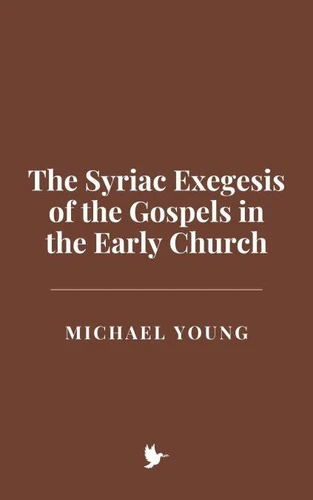The Syriac Exegesis of the Gospels in the Early Church
Par :Formats :
Disponible dans votre compte client Decitre ou Furet du Nord dès validation de votre commande. Le format ePub est :
- Compatible avec une lecture sur My Vivlio (smartphone, tablette, ordinateur)
- Compatible avec une lecture sur liseuses Vivlio
- Pour les liseuses autres que Vivlio, vous devez utiliser le logiciel Adobe Digital Edition. Non compatible avec la lecture sur les liseuses Kindle, Remarkable et Sony
 , qui est-ce ?
, qui est-ce ?Notre partenaire de plateforme de lecture numérique où vous retrouverez l'ensemble de vos ebooks gratuitement
Pour en savoir plus sur nos ebooks, consultez notre aide en ligne ici
- FormatePub
- ISBN8230842132
- EAN9798230842132
- Date de parution24/02/2025
- Protection num.pas de protection
- Infos supplémentairesepub
- ÉditeurIndependently Published
Résumé
The Syriac exegesis of the Gospels in the early Church presents a fascinating and often underappreciated tradition that shaped the theological landscape of Christianity. The early Syriac-speaking Christian communities, located primarily in the regions of modern-day Syria, Iraq, and Turkey, were instrumental in preserving, interpreting, and transmitting Christian thought during the first few centuries of the Church's existence.
These communities played a crucial role in shaping the theological and biblical foundations of Christianity, particularly in the interpretation of the Gospels. To understand the significance of Syriac exegesis, we must first look at the broader historical context, the key figures and concepts that influenced this tradition, and the primary sources that have survived through the ages. The early Syriac-speaking Church emerged at a time when Christianity was expanding rapidly, especially in the eastern regions of the Roman Empire.
As the Christian faith spread beyond its Jewish roots, the early Church encountered a variety of languages, cultures, and theological systems. The Syriac language, a dialect of Aramaic, was spoken by many of the early Christian communities, particularly in regions such as Edessa, Antioch, and Nisibis. This language, which was closely related to the language spoken by Jesus Christ, allowed Syriac-speaking Christians to maintain a deep connection to the cultural and religious heritage of the early Christian world.
These communities played a crucial role in shaping the theological and biblical foundations of Christianity, particularly in the interpretation of the Gospels. To understand the significance of Syriac exegesis, we must first look at the broader historical context, the key figures and concepts that influenced this tradition, and the primary sources that have survived through the ages. The early Syriac-speaking Church emerged at a time when Christianity was expanding rapidly, especially in the eastern regions of the Roman Empire.
As the Christian faith spread beyond its Jewish roots, the early Church encountered a variety of languages, cultures, and theological systems. The Syriac language, a dialect of Aramaic, was spoken by many of the early Christian communities, particularly in regions such as Edessa, Antioch, and Nisibis. This language, which was closely related to the language spoken by Jesus Christ, allowed Syriac-speaking Christians to maintain a deep connection to the cultural and religious heritage of the early Christian world.
The Syriac exegesis of the Gospels in the early Church presents a fascinating and often underappreciated tradition that shaped the theological landscape of Christianity. The early Syriac-speaking Christian communities, located primarily in the regions of modern-day Syria, Iraq, and Turkey, were instrumental in preserving, interpreting, and transmitting Christian thought during the first few centuries of the Church's existence.
These communities played a crucial role in shaping the theological and biblical foundations of Christianity, particularly in the interpretation of the Gospels. To understand the significance of Syriac exegesis, we must first look at the broader historical context, the key figures and concepts that influenced this tradition, and the primary sources that have survived through the ages. The early Syriac-speaking Church emerged at a time when Christianity was expanding rapidly, especially in the eastern regions of the Roman Empire.
As the Christian faith spread beyond its Jewish roots, the early Church encountered a variety of languages, cultures, and theological systems. The Syriac language, a dialect of Aramaic, was spoken by many of the early Christian communities, particularly in regions such as Edessa, Antioch, and Nisibis. This language, which was closely related to the language spoken by Jesus Christ, allowed Syriac-speaking Christians to maintain a deep connection to the cultural and religious heritage of the early Christian world.
These communities played a crucial role in shaping the theological and biblical foundations of Christianity, particularly in the interpretation of the Gospels. To understand the significance of Syriac exegesis, we must first look at the broader historical context, the key figures and concepts that influenced this tradition, and the primary sources that have survived through the ages. The early Syriac-speaking Church emerged at a time when Christianity was expanding rapidly, especially in the eastern regions of the Roman Empire.
As the Christian faith spread beyond its Jewish roots, the early Church encountered a variety of languages, cultures, and theological systems. The Syriac language, a dialect of Aramaic, was spoken by many of the early Christian communities, particularly in regions such as Edessa, Antioch, and Nisibis. This language, which was closely related to the language spoken by Jesus Christ, allowed Syriac-speaking Christians to maintain a deep connection to the cultural and religious heritage of the early Christian world.























